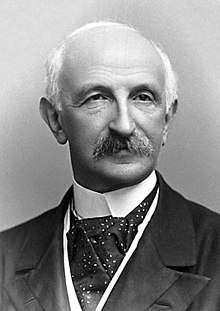Tobias Asser
Tobias Michael Carel Asser (born April 28, 1838 in Amsterdam , † July 29, 1913 in The Hague ) was a Dutch lawyer and politician . He made a name for himself in the area of international civil law and received the Nobel Peace Prize in 1911 for his services to the establishment of the Permanent Court of Arbitration in The Hague.
Life
Tobias Asser came from a wealthy Dutch Jewish family of lawyers, his father and grandfather practiced as lawyers, and one uncle was Minister of Justice. He studied law at the Athenaeum Illustre in Amsterdam , which became the Universiteit van Amsterdam in 1876 , and received his doctorate here in 1860. In the same year he became a member of an international commission negotiating the abolition of customs duties on the Rhine . After practicing as a lawyer for a short time, he taught civil law at the Athenaeum in Amsterdam from 1862 . After the University of Amsterdam emerged from this institution, he held the chair for international law and business law until 1893 .
In Dutch politics he was a legal advisor to the Ministry of Foreign Affairs from 1875 , from 1893 as a member of the Council of State and from 1904 until his death as a minister without a portfolio. In the course of his career he dealt in particular with international civil law , advocating extensive international standardization.
Together with the Englishman John Westlake and the Belgian Gustave Rolin-Jaequemyns , he founded the Revue de Droit International et de Legislation Comparée (Journal of Comparative and International Law), which was first published at the end of 1868 and was the first academic journal in the field of international law Acted right . In September 1873 he was one of the 11 lawyers who founded the Institut de Droit international (Institute for International Law) in the Belgian city of Ghent , an institution that was awarded the Nobel Peace Prize in 1904. In 1898 he chaired the 18th meeting of the institute in The Hague .
With the support of the Dutch government, Tobias Asser organized a series of international conferences in The Hague between 1893 and 1904, which were attended by representatives from most European countries. There it was possible for the first time to conclude international treaties on the standardization of the conduct of civil proceedings and family law . In 1899 and 1907 Tobias Asser was a Dutch delegate at the Hague Peace Conferences , where he played a decisive role in the establishment of the Permanent Court of Arbitration in The Hague, which he also belonged to at the first hearing in 1902.
In 1904 he was given the honorary title of Minister of State . The American Society for International Law made him an honorary member in 1910. A year later he and Alfred Hermann Fried received the Nobel Peace Prize for their work in setting up the Permanent Court of Arbitration. He has also received honorary doctorates from several universities, including the University of Edinburgh , the University of Cambridge , the University of Bologna and the Humboldt University of Berlin .
In 1864 he married Johanna Ernestina Asser (1839–1917). Her son's name was Carel Daniel Asser (1866–1939).
His niece was the pacifist Hetta Countess Treuberg (née Kaufmann-Asser).
His grave is in the Dutch cemetery Oud Eik en Duinen in The Hague .
Works (selection)
- Schets van het internationaal privaatregt. Haarlem 1879; German edition: The international private law. Weidmann, Berlin 1880
- Studies op het gebied van right state. Haarlem 1889
- La codification du droit international privé. Haarlem 1901
- La Convention de la Haye on November 14th, 1896. Bohn, Harlem 1901
Web links
- Literature by and about Tobias Asser in the catalog of the German National Library
- Information from the Nobel Foundation on the awarding of the award to Tobias Asser in 1911 (English)
- TMC Asser Instituut (English)
- State Minister Asser dies. In: Neue Freie Presse , July 30, 1913, p. 8 (online at ANNO ).
| personal data | |
|---|---|
| SURNAME | Asser, Tobias |
| ALTERNATIVE NAMES | Asser, Tobias Michael Carel (full name) |
| BRIEF DESCRIPTION | Dutch lawyer and politician |
| DATE OF BIRTH | April 28, 1838 |
| PLACE OF BIRTH | Amsterdam |
| DATE OF DEATH | July 29, 1913 |
| Place of death | The hague |
